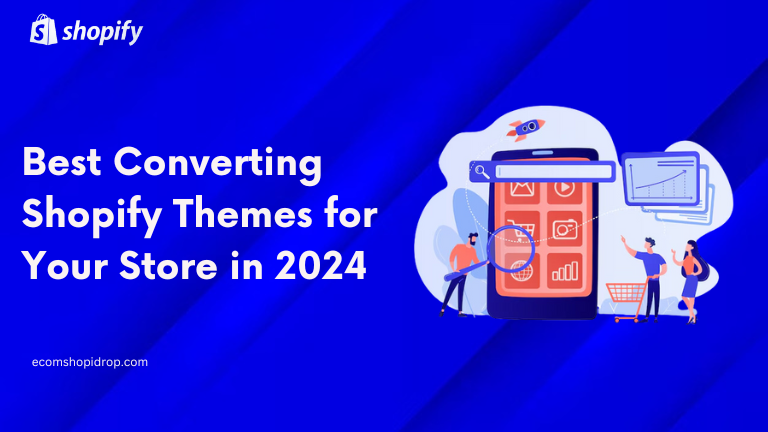
By the end of this guide, you will have an idea of the best SEO Apps for Shopify.
Having a strong online presence is crucial for the success of any business, especially for e-commerce stores, in the modern digital landscape. Search engine optimization (SEO) plays a pivotal role in driving organic traffic to your Shopify store and increasing your visibility on search engine results pages (SERPs). To help you navigate the world of SEO, we’ve curated a list of the best SEO apps for Shopify that can take your store to the next level.
Understanding Shopify SEO Basics
Understanding the basics of SEO for your Shopify store is essential for improving its visibility and attracting more organic traffic. Here are some key concepts to help you get started:
What is SEO?
SEO or search engine optimization, which is the process of improving your website to rank higher in search engine results pages (SERPs).. The goal of SEO is to increase organic (non-paid) traffic to your site by improving its visibility and relevance to search engine users.
Key Elements of SEO for Shopify Stores
- Keyword Optimization: Identify relevant keywords related to your products or niche and incorporate them into your product descriptions, meta tags, and URLs.
- Meta Tags: Meta tags, including meta titles and meta descriptions, provide search engines with information about your store’s content. They should be descriptive, and relevant, and include targeted keywords.
- URL Structure: Create URLs that describe the content of your page and include keywords that are relevant to your content. Avoid using generic URLs like “product123” and instead use URLs that reflect the content of the page, such as “best-red-dresses.”
- Content Optimization: Create high-quality, informative content that is optimized for your target keywords. This can include product descriptions, blog posts, and other content that provides value to your audience.
- Backlinks: Backlinks are links that come from other websites to your site. They are an important factor in SEO, as they indicate to search engines that your site is reputable and authoritative.
- Site Speed: A fast-loading website is crucial for SEO. Slow-loading sites can frustrate users and lead to lower search engine rankings.
- Mobile Optimization: With the increasing use of mobile devices, it’s important to ensure that your Shopify store is optimized for mobile users. This includes having a responsive design and fast loading times on mobile devices.
Best Practices for Shopify SEO
- Conduct keyword research to identify relevant keywords for your store.
- Optimize your product descriptions, meta tags, and URLs with targeted keywords.
- Regularly update your store’s content to keep it fresh and engaging for visitors.
- Utilize headings and subheadings to structure your content, making it more organized and easier for search engines to comprehend.
- Optimize your images with descriptive alt text to improve accessibility and SEO.
By understanding these basic concepts of SEO, you can optimize your Shopify store for better visibility and attract more organic traffic.
Criteria for Selecting the Best SEO Apps for Shopify
When selecting the best SEO apps for Shopify store, several key criteria can help you make an informed decision. These factors can vary depending on your store’s specific needs and goals, but the following are some general guidelines to consider:
- Features: Look for apps that offer a comprehensive set of features to cover all aspects of SEO. This includes keyword optimization, meta-tag optimization, content analysis, backlink tracking, and sitemap generation. The more features an app offers, the more effectively you can optimize your store’s SEO.
- Ease of Use: Choose an app that is easy to use and integrates seamlessly with your Shopify store. A user-friendly interface and intuitive design can save you time and make the optimization process more efficient.
- Pricing: Consider the pricing structure of the app and whether it fits within your budget. Some apps offer a one-time fee, while others have a monthly subscription. Compare the features and pricing of different apps to find the best value for your money.
- Reviews and Ratings: Read reviews and ratings from other Shopify store owners to get an idea of the app’s performance and reliability. Look for apps with positive reviews and high ratings, as they are more likely to deliver results.
- Support and Updates: Choose an app that offers reliable customer support and regular updates. This ensures that you can get help when you need it and that the app stays up-to-date with the latest SEO trends and algorithms.
- Compatibility: Ensure that the app is compatible with your Shopify store’s theme and other apps. Compatibility issues can cause problems and hinder your SEO efforts.
- Trial Period: Look for apps that offer a free trial period so you can test the app’s features and see if it meets your needs before committing to a purchase.
By considering these criteria, you can select the best SEO app for your Shopify store and take your SEO strategy to the next level.
Best SEO Apps for Shopify
Here are detailed descriptions of some of the best SEO apps for Shopify:
1. BOOSTER SEO & IMAGE OPTIMIZER
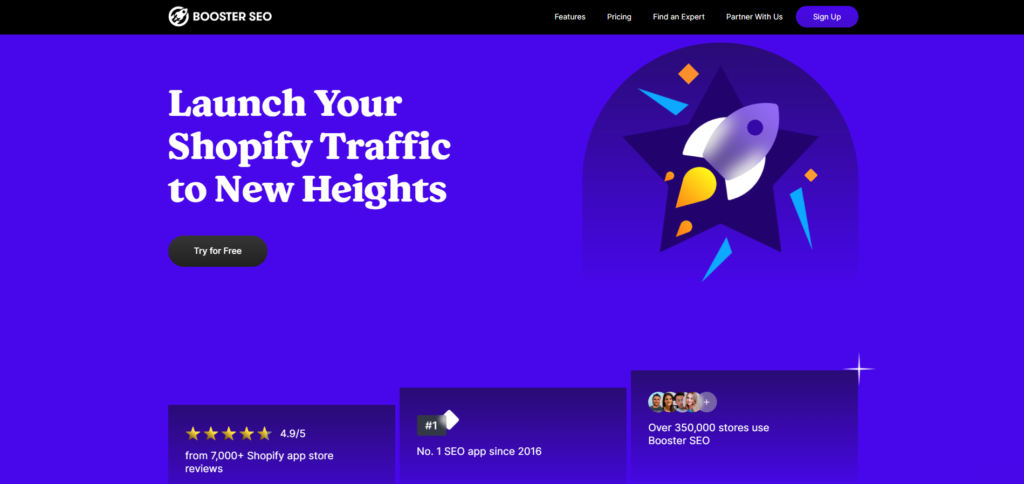
SEO Booster – SEO Marketing is a versatile SEO app designed to quickly prepare your site for Google SEO, making it a must-have for all Shopify stores. It helps increase your website’s visibility on Google by enhancing meta titles and descriptions, improving the visibility of product images on Google Image Search, and displaying product ratings, prices, and stock amounts on Google Search using JSON-LD. The app also automatically removes SEO negative factors such as broken links, long URLs, and duplicate content. SEO Booster offers features for masterly handling SEO keywords with suggestions based on the latest data, prioritizing AMP to rank higher in Google bots, and improving mobile experience. With its easy-to-use interface, comprehensive guide, auto-resolving SEO and Google issues, live chat support, and expert team handling SEO customization requests, SEO Booster makes SEO tasks more efficient and seamless.
Pricing
- Free Plan: $0/month
- Pro Plan: $39/month
- Premium Plan: $69/month
Booster SEO is all you need to improve SEO scores easily and it’s one of the best SEO apps for shopify Free plan available. Free trial available.
2. Yoast SEO
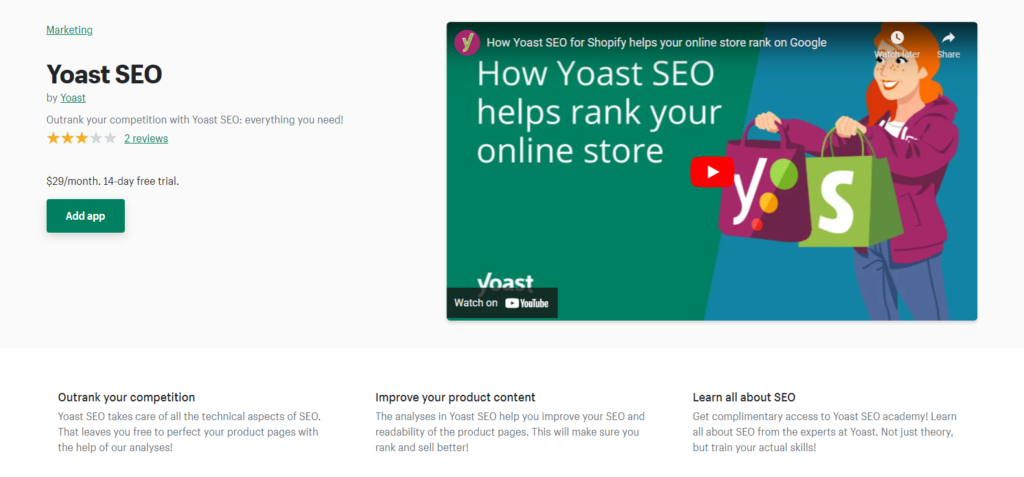
Recently added to the Shopify App Store, Yoast SEO is a popular tool for improving website SEO. It automatically adds structured data to your site, helping Google understand your store better. With Yoast SEO, you can optimize your content for search engines, edit SEO titles, slugs, and meta descriptions, get real-time feedback, set defaults for your search results appearance, and receive indications for SEO optimization. The app also helps make your product pages look great in search results.
Pricing
Yoast SEO is $19/month + Free trial available
3. Bulk Image Edit – Image SEO
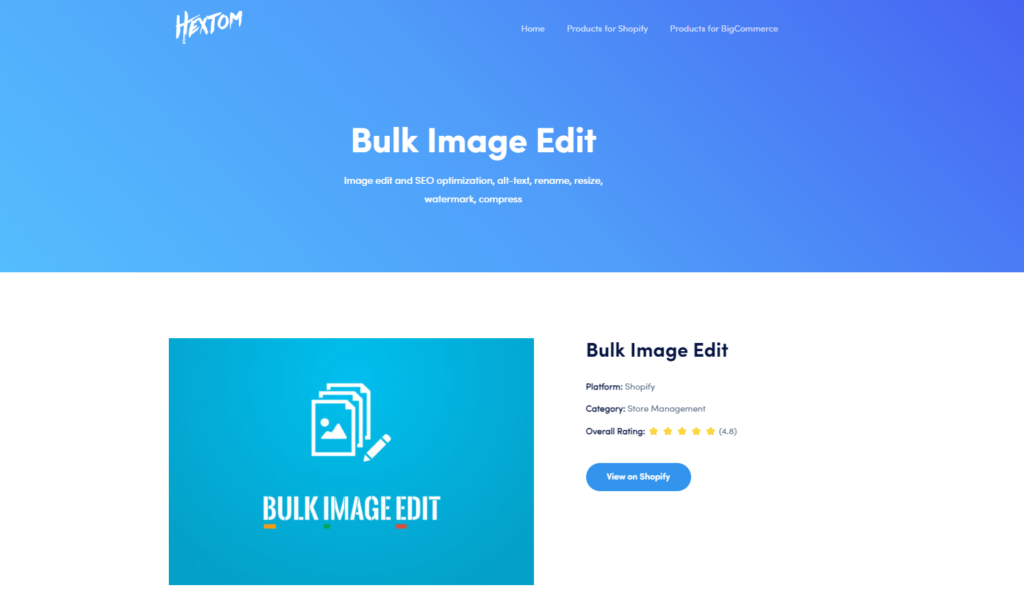
The Bulk Image Edit app helps improve your store’s ranking by optimizing images, alt text, and file names. It makes your products look professional and generates more sales. The app offers bulk square, resize, or crop images to fit any platform, optimizes SEO, and minimizes image file sizes without quality loss. It also allows you to add text or image-based watermarks to protect your product images from being stolen by competitors.
Pricing
- Free Plan: $0/month
- Basic Plan: $9.99/month
- Pro Plan: $19.99/month
- Advanced Plan: $49.99/month
- Enterprise Plan: $99.99/month
Bulk Image is one of the best seo apps for shopify to optimize SEO, compress images for a professional and fast website
4. AVADA SEO: Image Optimizer
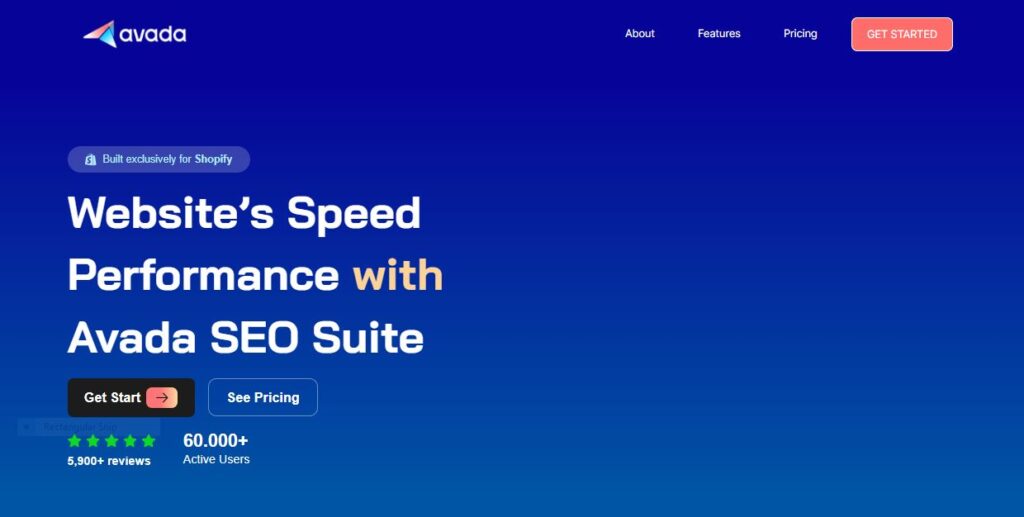
AVADA SEO is a comprehensive tool that helps with SEO optimization without much technical expertise. It improves website loading speed, store ranking, and conversion rates by optimizing images, ensuring faster Google index of website images and content, providing Google structured data, standardized meta tags, and integration with Google Search Console.
Pricing
- Free: $0/year
- Pro Plan: $348/year
- Enterprise: $990/year
Avada SEO Suite its high-performing services come with a 14-day FREE Trial.
5. Plug In SEO
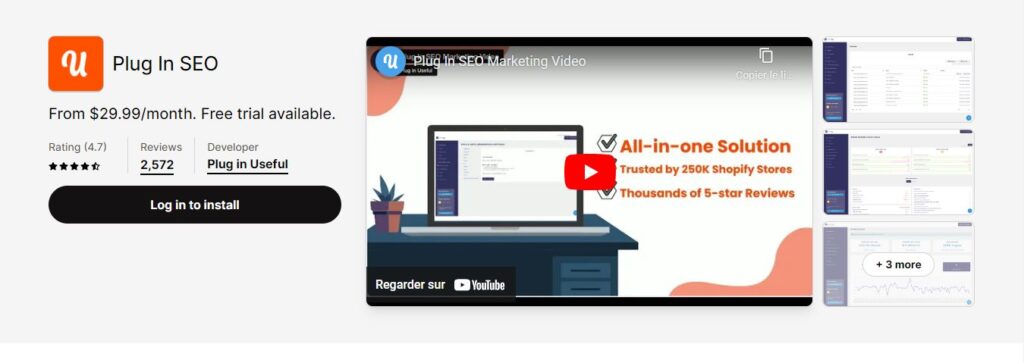
Plug In SEO is a simple and easy-to-use app that helps identify SEO problems on your Shopify store. It provides SEO check and instructions for products, collections, pages, and blogs, keywords check and instructions, automatic addition of JSON-LD structured data, powerful title and meta description templating, title and meta description editing for every page, compatibility with all apps, image ALT text template setup, broken links checker and fix directions. The app respects the SEO already set up in your Shopify admin and offers tools for effective SEO management.
Pricing
Plug in SEO available From $29.99/month. Free trial available.

Tips for Maximizing SEO Results on Shopify
To maximize your SEO results on Shopify, consider implementing the following tips:
Keyword Research: Conduct thorough keyword research to identify relevant keywords for your products or niche. Use tools such as Google Keyword Planner, Ahrefs , or Semrush to identify keywords that strike the perfect balance between high search volumes and low competition.
- Optimize Product Titles and Descriptions: Use targeted keywords in your product titles and descriptions to improve their visibility in search engine results. Make sure the titles and descriptions are descriptive, informative, and compelling to attract clicks.
- Use SEO-Friendly URLs: Create SEO-friendly URLs for your product pages that include relevant keywords. Avoid using generic URLs and instead use descriptive URLs that accurately reflect the content of the page.
- Optimize Meta Tags: Write compelling meta titles and descriptions for your pages that include relevant keywords. Meta tags play a crucial role in search engine results, and can greatly impact click-through rates.
- Optimize Images: Use descriptive file names and alt text for your images to improve accessibility and SEO. This helps search engines understand what your images are about, which can make them more likely to show up in image search results.
- Create High-Quality Content: Publish high-quality, informative content on your Shopify store, such as blog posts, guides, or product reviews. This not only helps attract organic traffic but also establishes your store as an authority in your niche.
- Optimize for Mobile: Make your Shopify store optimized for mobile devices. Use a responsive design and optimize your site’s loading speed for mobile users, as Google considers mobile-friendliness a ranking factor.
- Internal Linking: Use internal linking to connect related pages on your site. This helps search engines crawl and index your site more effectively, leading to improved SEO.
- Monitor and Analyze Performance: Use tools like Google Analytics and Google Search Console to monitor your site’s performance and identify areas for improvement. Analyze your site’s traffic, rankings, and click-through rates to make informed decisions about your SEO strategy.
- Stay Updated with SEO Trends: SEO is constantly evolving, so it’s important to stay updated with the latest trends and algorithm changes. Subscribe to SEO blogs, attend webinars, and follow industry experts to stay informed and adapt your strategy accordingly.
Implementing these tips can help you maximize your SEO results on Shopify and improve your store’s visibility in search engine results.
Key Takeaways
Improving your Shopify store’s SEO is essential for driving organic traffic and increasing your visibility online. By using the best SEO apps for Shopify and implementing effective SEO strategies, you can take your store to new heights and attract more customers.
FAQ
Q: Do I need technical skills to use SEO apps for Shopify?
A: No, most SEO apps for Shopify are designed to be user-friendly and do not require any technical skills.
Q: How long does it take to see results from These Best SEO apps for Shopify?
A: SEO is a long-term strategy, and while some improvements may be noticeable in a matter of weeks, significant results often take several months of consistent effort.


